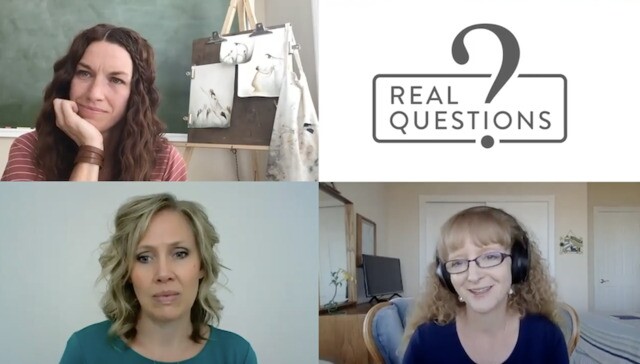This article was originally published in August 2020.
The principle of revelation can be hard to understand, especially when it comes to anxiety. How can you tell if you’ve made up an answer or if it’s actually revelation from God? Is the Spirit warning you about something, or is it your anxiety getting in the way?
A Deseret Book Live! video answers these issues and more in “Real Questions: Personal Revelation.” In this segment, artist Kate Lee hosts a discussion between individuals with questions and professionals in order to discover what seeking personal revelation looks like in everyday life.
During the discussion, Aliah Hall—a marriage and family therapist and contributor to the Sunday on Monday study group—talks about the importance of learning how the Spirit speaks to you so you can have a stronger relationship with Heavenly Father.
“Heavenly Father’s really going to talk to us about what’s going on with us right now. It’s very present-oriented. It’s very specific and very narrow-focused. Anxiety, on the other hand, is general and the more you think about it, the more and more and more worried [you] can get. Whereas the Spirit, as you accept it, the calmer you feel. And for everybody, the Spirit speaks differently,” Hall said. “And so part of our journey here on earth is to figure out how the Spirit talks to us. But understanding that anxiety . . . that part of our brain that’s going off . . . is trying to keep us safe. It’s not trying to move us forward.”
Hall said staying mindful and calming the body can be helpful in receiving revelation and communicating with God.
“If you’re having a lot of anxiety around decisions that you have to make, or big choices that are coming up, and you’re feeling anxious, it really is about calming your body and calming your mind. Mindfulness is really helpful . . . that’s not like meditation where you’re trying to empty your mind, but it’s concentrated focus on your heartbeat, your breath, slowing your breath, slowing your heartbeat, calming your body, calming your mind, so that all that clatter, all that static that comes can be smoothed away and that you can hear the voice of the Lord more clearly,” she said.
► You may also like: Watch this Deseret Book Live! video about this new Church member’s 4-year journey to baptism
Carrie Skarda, one of the authors of Power of Stillness: Mindful Living for Latter-day Saints, also shared thoughts on mindfulness in the segment. A clinical psychologist for over 20 years, Skarda spoke about finding the physical, spiritual, and emotional space to receive revelation in a chaotic world—especially during the pandemic. Rather than trying to control the chaos, Skarda suggests learning “how to be less reactive to it,” sharing the story of the woman in the New Testament who reached out to touch the Savior’s garment when He was nearby.
“And He’s so present in His body and in the moment that He doesn’t miss it, even though there are very important things going on and there’s this big crowd of people, He doesn’t miss this really invisible beggar woman touching the hem of His robe. And He turns to her and He can redirect and be present in the moment with her,” Skarda said. “And I really try to hold that example in my mind in terms of this is an example of Christ receiving revelation in the moment, even though He had other important tasks and people pressing on Him. And part of what He did was He stayed present in His body. And so I try and stay present in my body. And when I find myself getting really flustered and upset, I try and come back to my body and be present in my body so that I can be more open to the revelation Heavenly Father is giving me and be less reactive to the chaos around me.”
Guest S. Michael Wilcox also appeared on the segment. As a Time out For Women speaker and the author of many books, including What Seek Ye?: How the Questions of Jesus Lead Us to Him, Wilcox addressed the question of whether you made up revelation that you thought you received, or if it’s from God.
“I’m not sure it matters whether it came from God or from you. You are trying to do what’s right—praying, pondering, fasting . . . and as long as we’re trying to do what’s right, God will honor it. So, God honors the effort,” he said.
Sometimes the word “revelation” can be scary, Wilcox explained, because it is something received by prophets and Apostles. So thinking about it in terms of “nudges,” “inspiration,” or “hunches” can be useful. It’s also important remember that it’s okay if we make mistakes when it comes to revelation.
“We learn and we grow. And . . . just like all learning and growing, we’re going to do it better at some times than we do at other times,” he said. “So we cut ourselves a little slack and realize that maybe we . . . are learning and we are growing. And we might make some mistakes. And that will be okay if we do that.”


